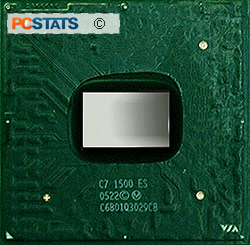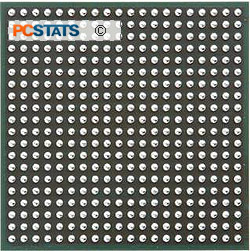While VIA is known more as a chipset manufacturer than
anything else, the company has had its own line of x86-based processors for a
while now. You might remember the company briefly reviving the 'Cyrix' processor
brand back in 2000, before moving on to its own 'C3' processors a year later.
While the C3 did not do particularly well in the marketplace, VIA's processors were notable
for one major reason; they were (and are) extremely cool running
and economical on power. One of the selling points of the original
C3 was that it could be easily run using passive cooling only, and so it
found some following for embedded-type applications.
VIA recently announced plans for another in the 'C' line
of processors, this time dedicated to mobile use. The VIA C7-M is the mobile
version of the C7 processor which was released in May of 2005. The VIA C7-M is slated
to become available in November 2005 in speeds of 1.5GHz or 1.8GHz. During a
recent briefing by the company, PCSTATS was shown the CPU in its A2 stepping.
Possibly aiming to fill the market gap left by the apparent
demise of Transmeta as a processor manufacturer, VIA has designed the C7-M
with low power requirements and software security as the biggest areas of emphasis.
The company is targeting the VIA C7-M at almost every segment of the laptop market, though it
won't directly compete with the high-powered Intel Pentium M and AMD Turion processors in
full-size laptops on the benchmark front at least, power efficiency is another story altogether.
According to the company, the
only laptops not suitable for VIA C7-M processors are the 'luggables', large and heavy desktop-replacement laptops.
Since these usually use desktop-style processors anyhow, this is not much of a
surprise. Realistically, when the VIA C7-M is released later in the fall,
the design wins it gets will really indicate what it's
best suited for; at the moment we'd
speculate ultra portables, and perhaps even a tablet PC.
 |
 |
The VIA C7-M is produced by Centaur, VIA's
manufacturing subsidiary. The processor is made with a 90nm
IBM SOI (Silicon-On-Insulator) fabricating process. One of the most remarkable attributes
of the VIA C7-M is its tiny size; the processor die is a 30mm square NanoBGA2 package,
smaller than a postage stamp - making it an extremely affordable chip to
manufacture. Because of this BGA packaging the VIA C7-M processor will is soldered directly to
the motherboard, but since processor replacement has never been a
feature of notebook design this is par for the course.
Integrated encryption and security:
VIA's Padlock co-processor
 The C7-M features VIA's Padlock security co-processor,
which is dedicated to encryption and unencryption duties. This should give the
C7-M a boost in these CPU-intensive activities as compared to other lightweight mobile processors. The Padlock security
co-processor is entirely specialized towards encryption, acting as an
'encryption accelerator' rather like a 3D card accelerates 3D video by taking the
strain of vertex and pixel computation off the CPU. Some of
its abilities include:
The C7-M features VIA's Padlock security co-processor,
which is dedicated to encryption and unencryption duties. This should give the
C7-M a boost in these CPU-intensive activities as compared to other lightweight mobile processors. The Padlock security
co-processor is entirely specialized towards encryption, acting as an
'encryption accelerator' rather like a 3D card accelerates 3D video by taking the
strain of vertex and pixel computation off the CPU. Some of
its abilities include:
AES encryption at up to 25GB/s. The
padlock supports all AES modes through the Padlock ACE (Advanced Cryptography
Engine). This ability allows the C7-M processor to offload AES
encryption tasks to the Padlock co-processor and avoid getting bogged down
by this traditionally processor-intensive activity. The Padlock ACE does
not require special software support to aid in AES encryption
tasks.
Accelerated RSA encryption. RSA or Public Key
encryption also involves significant mathematical calculations that can slow down
the processor. The Padlock processor cannot entirely take over the process
of RSA encryption as it can with AES, but it does incorporate 'Montgomery
Multipliers' which speed up the necessary calculations.
SHA-1/SHA-256 support. The Padlock can encrypt
data with a secure hashing algorithm in real-time, placing a digital 'stamp'
on everything processed. In theory, this should allow for tamper-proof
document transmission to be carried out automatically, but software developers
would have to build support for this into their applications
first.
Dual hardware-based random number
generators provide a foundation for the encryption processes that the Padlock
co-processor carries out. The way these two generators work is kind of
interesting. VIA's quantum Random Number Generators detect minute random
variances in the frequency of the various system clocks and turn them into
random numbers. Both RNGs are 'always on', generating random numbers
constantly and providing them to the other components of the Padlock
co-processor when needed.
Finally, the Padlock provides support
for the 'NX' execution prevention technology included in Windows
XP Service Pack 2. This feature is also found in the
newest processors from Intel and AMD, and prevents worms, viruses or other
hostile intruders from executing code in memory spaces reserved
for legitimate programs by causing a buffer
overrun.
The Padlock co-processor is to go hand-in-hand with VIA's Padlock software applications.
These will likely ship with VIA C7-M equipped systems and
provide a way for users to exploit the security and encryption features of the
processor with appropriate third party software programs.
While VIA's processors have always
had good thermal and power characteristics, we're interested in is performance.
How is the VIA C7-M going to measure up against the
best Intel and AMD mobile processors?

